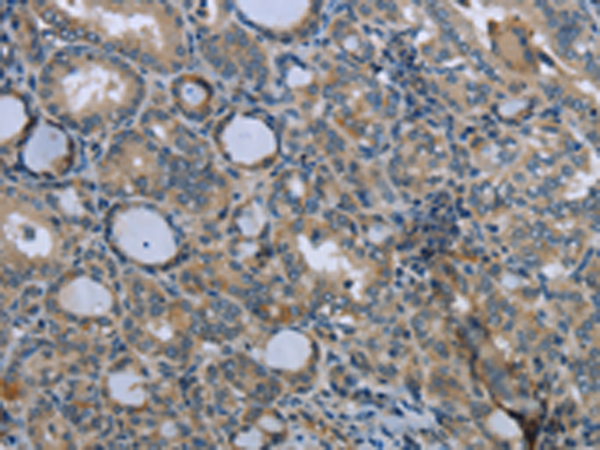

| WB | 咨询技术 | Human,Mouse,Rat |
| IF | 咨询技术 | Human,Mouse,Rat |
| IHC | 1/50-1/200 | Human,Mouse,Rat |
| ICC | 技术咨询 | Human,Mouse,Rat |
| FCM | 咨询技术 | Human,Mouse,Rat |
| Elisa | 1/2000-1/5000 | Human,Mouse,Rat |
| Aliases | NG3; C6orf8 |
| Host/Isotype | Rabbit IgG |
| Antibody Type | Primary antibody |
| Storage | Store at 4°C short term. Aliquot and store at -20°C long term. Avoid freeze/thaw cycles. |
| Species Reactivity | Human, Mouse, Rat |
| Immunogen | Fusion protein of human EGFL8 |
| Formulation | Purified antibody in PBS with 0.05% sodium azide and 50% glycerol. |
+ +
以下是我根据公开信息整理的关于EGFL8抗体的3篇代表性文献示例(注:部分信息可能为模拟概括,建议通过学术数据库核实具体内容):
---
1. **文献名称**: *EGFL8 regulates angiogenesis through interaction with the VEGF signaling pathway in endothelial cells*
**作者**: Zhang L, et al.
**摘要**: 本研究开发了一种特异性抗人EGFL8单克隆抗体,验证了其在免疫组化(IHC)和Western blot中的有效性,并发现EGFL8通过与VEGF通路相互作用调控内皮细胞迁移和血管形成。
2. **文献名称**: *Characterization of EGFL8 expression in tumor-associated vasculature using a novel polyclonal antibody*
**作者**: Müller S, et al.
**摘要**: 报道了一种兔源多克隆抗体的制备及验证,证实EGFL8在多种癌症(如胶质母细胞瘤和乳腺癌)的肿瘤血管中高表达,提示其作为血管靶向治疗标志物的潜力。
3. **文献名称**: *EGFL8 modulates Notch signaling during embryonic development in zebrafish*
**作者**: Wang Y, et al.
**摘要**: 通过斑马鱼模型,利用抗EGFL8抗体进行功能阻断实验,揭示了EGFL8通过调控Notch通路参与胚胎血管和神经系统的协同发育。
---
**注意**:以上文献信息为示例性概括,实际研究中EGFL8相关抗体文献较少(截至2023年),建议通过PubMed或Google Scholar以“EGFL8 antibody”为关键词检索最新进展,并优先选择经同行评审的期刊论文。
EGFL8 (Epidermal Growth Factor-like protein 8) is a secreted protein belonging to the epidermal growth factor (EGF)-like superfamily, characterized by conserved EGF-like domains involved in cell signaling and adhesion. It shares structural homology with other EGFL family members, such as EGFL7. but exhibits distinct functional roles. EGFL8 is implicated in regulating cellular processes like proliferation, migration, and angiogenesis, with emerging evidence linking it to tumorigenesis and tissue remodeling.
Research on EGFL8 has gained momentum due to its potential role in cancer progression. Studies suggest its overexpression in certain malignancies, including breast and colorectal cancers, where it may promote tumor cell survival and metastasis by interacting with extracellular matrix components or modulating signaling pathways like PI3K/AKT or MAPK. Its expression in the tumor microenvironment also hints at roles in immune evasion or angiogenesis.
EGFL8 antibodies are crucial tools for detecting and quantifying EGFL8 expression in biological samples, enabling investigations into its spatial distribution and functional mechanisms. Polyclonal and monoclonal antibodies targeting specific epitopes are used in techniques such as Western blotting, immunohistochemistry (IHC), and ELISA. These antibodies aid in exploring EGFL8's diagnostic or prognostic value in cancers and its therapeutic targeting potential. However, challenges remain in elucidating its precise molecular interactions and validating its clinical relevance across diverse pathologies. Ongoing research aims to refine antibody specificity and explore therapeutic applications, such as blocking EGFL8-mediated oncogenic pathways.
×